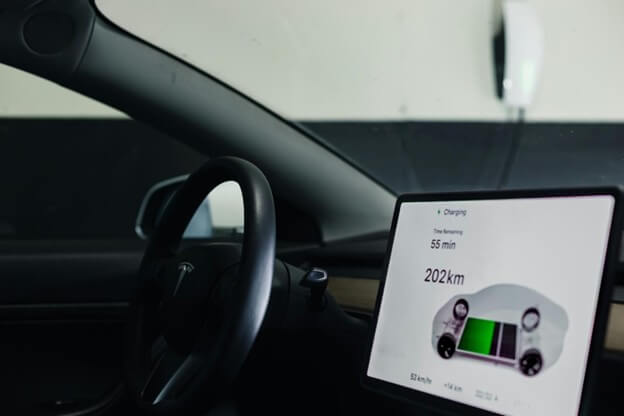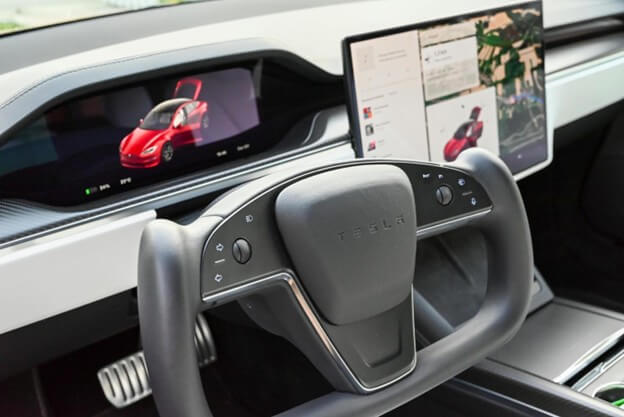While internal combustion engine vehicles get their energy from fuel, electric vehicles derive their power directly from a battery pack. The battery of an electric vehicle is often compared to a scaled-up version of the lithium-ion (Li-ion) battery found in your mobile phone. However, unlike mobile phones, electric vehicles do not use a single battery. Instead, EVs are equipped with a large battery pack composed of thousands of Li-ion cells working together. As electric vehicles gain popularity due to their eco-friendliness and comfort, many potential users have questions about battery lifespan and replacement. This article covers everything you need to know about electric vehicle battery life and replacement.

Image Credit: Unsplash / Priscilla Du Preez
Can Electric Vehicle Batteries Be Replaced?
Electric car batteries are among the replaceable components of an EV. Typically, the lifespan of an electric vehicle battery is quite long. Depending on technology, charge cycles, and charge type, these batteries can last up to 15-20 years. The primary indicator for battery replacement is its power level. If battery power drops below 70%, a replacement may be necessary. Likewise, vehicles that have traveled between 100,000 and 160,000 kilometers are often recommended for battery replacement. A study conducted by Recurrent on 15,000 electric vehicles found that battery replacement is rare, with only 1.5% of vehicles requiring a new battery.
How Is Battery Replacement Done, and What Are the Methods?
Electric vehicle batteries are designed to last many years. In fact, many EV manufacturers guarantee their battery life for up to 8 years or 100,000 miles. To extend battery life, EV manufacturers implement reserve capacity adjustments, preventing drivers from using the full battery capacity and reducing cycle counts. When the battery capacity falls below 70%, drivers may begin to notice a decline in vehicle performance. However, this process takes a long time to occur.
Electric car battery replacement consists of three main steps. Since EVs already have easily accessible and removable battery packs, the first step in replacing an expired battery is to visit a service station. At the replacement station, the depleted battery pack is removed from the vehicle and replaced with a fully charged one.
Because the battery is located in the lower section of the vehicle, specialized equipment and modifications to the vehicle's onboard computer system are required for the replacement. After the new battery is installed, software updates are performed to ensure compatibility between the battery and the vehicle’s system. As this process requires technical expertise, EV owners should always have their battery replacements carried out at an authorized service center.
When it comes to electric vehicle batteries, many people are concerned about costs. However, there is no need to worry too much. Most EV manufacturers provide warranties of up to 8 years or 100,000 miles for their batteries, meaning that if something goes wrong, the replacement is usually covered under warranty. Battery replacement costs vary depending on the EV model, battery pack size, and manufacturer.

Image Credit: Pexels / Vladimir Srajber
How Many Years Does an Electric Vehicle Battery Last?
The lifespan of an electric vehicle battery depends on the vehicle model, battery pack size, usage, and range. However, many EV manufacturers state that their batteries last around 15-20 years or between 100,000 and 160,000 miles. Users can extend their battery life by adopting good charging habits and considering environmental factors. Here are some tips to prolong battery life:
Use fast charging cautiously EV charging methods are divided into three levels: Level 1, Level 2, and Level 3. Home chargers and public charging stations usually provide AC charging, which charges the vehicle slowly. In contrast, DC fast chargers are known for their rapid charging capabilities. It is recommended to use AC chargers whenever possible, as DC fast chargers can overstress battery cells and shorten battery life. EV manufacturers suggest using fast-charging stations mainly for long trips or emergencies.
Keep battery charge between 20-80% To protect the electric car battery, avoid letting the charge drop below 20%. Completely draining and recharging the battery requires extra power, which can reduce battery lifespan. Similarly, charging beyond 80% is not recommended, as maintaining this range can help extend battery life.
Protect the battery from extreme heat Electric vehicles have automatic temperature control systems that help maintain efficiency by discharging power to keep temperatures low. Parking an EV in direct sunlight during hot weather can cause the battery to drain on its own. To prevent this, always park your vehicle in the shade and, if possible, keep it plugged in to use grid power instead of the battery.
Check tire pressure regularly Tire pressure is another factor affecting EV battery life. Low tire pressure increases energy consumption and drains the battery faster. Additionally, excessive strain on the battery can negatively impact its long-term performance. To extend battery life, make sure to check and maintain proper tire pressure at regular intervals.
By following these habits, an electric car battery can last up to 15-20 years.

Image Credit: Pexels / Jeswin Thomas
When Should an Electric Vehicle Battery Be Replaced?
Current electric vehicle batteries have lifespans ranging from 8 to 20 years. Battery longevity depends on factors such as materials used, charging frequency, charging method, and overall quality. If users follow best practices for battery maintenance, a battery can last up to 250,000 kilometers. In general, battery replacement is recommended for vehicles that have traveled between 100,000 and 160,000 kilometers. Additionally, if battery capacity drops below 70%, a replacement is highly recommended. If users experience a loss in vehicle performance, battery replacement may be necessary.
Tesla offers an 8-year or 160,000 km warranty for the Model 3, 8 years or 193,000 km for the Model Y, and 8 years or 240,000 km for the Model S and Model X, ensuring that battery capacity remains at least 70% during this period.
Hyundai provides a 10-year or 160,000 km warranty for electric vehicle batteries manufactured since 2020. BMW guarantees that their EV batteries will retain at least 70% of their original capacity for 8 years or 160,000 km. TOGG states that the T10X can operate for 8 years or 160,000 km with a single battery. Nissan, which uses lithium-ion batteries, offers an 8-year or 160,000 km warranty for the Leaf model.
Batteries that have reached the end of their lifespan can be repurposed for energy storage in homes and businesses. Used EV batteries can function as generators, providing extra energy for simple applications. Once completely depleted, batteries should be sent to recycling facilities. At these facilities, battery components are separated, and recyclable materials are extracted for reuse in new battery production. Non-recyclable components undergo special processing to prevent environmental harm. This ensures that electric vehicle batteries have a long lifespan while minimizing environmental impact through proper recycling.








